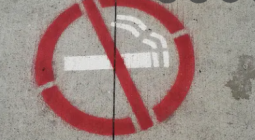I led the US lawsuit against big tobacco for its harmful lies. Big oil is next
In 2005, I was the lead counsel on behalf of the US in one of the biggest corporate accountability legal actions ever filed. That trial proved that the tobacco industry knew it was selling and marketing a harmful product, that it had funded denial of public health science, and had used deceptive advertising and PR to protect assets instead of protecting consumers.
Today, the fossil fuel industry finds itself in the same precarious legal position as the tobacco industry did in the late 1990s. The behaviour and goals of the tobacco and petroleum industries are pretty similar – and there are many similarities in their liabilities.
Both industries lied to the public and regulators about what they knew about the harms of their products. Both lied about when they knew it. And like the tobacco industry while I was in public service, the deceptive advertising and PR of the fossil fuel industry is now under intense legal scrutiny.
And the tide is beginning to turn. More than 1,800 lawsuits have been filed over climate liability worldwide. Many of these concern the misleading fake science that the industry purposely distributed to the public for decades, denying that its product was the leading cause of global climate change. Exxon knew the reality of climate change in the late 1970s and then later invested in telling the public it was not happening. The French giant Total knew and similarly funded efforts to mislead the public at around the same time.
You can see echoes of the tobacco strategy in each of the memos from corporate scientists studying the climate at fossil fuel companies. Since the 1950s, tobacco companies have been certain of the health impacts of their products. Still, they spent the next 40 years developing public affairs strategies that downplayed the problem and sought to make their products more habit-forming. They did it through additives and marketing to children. At the same time, fossil fuel companies strive to keep us hooked by fighting regulations to move us towards low-carbon transportation and fearmongering about the climate transition.
They also both funnelled money into promoting fake science. The American Petroleum Institute and Exxon injected large grants into the climate denial research of astrophysicist Willie Soon, in the same way that tobacco companies propped up misleading health research from well-compensated friendly scientists. The full extent of this work may never be known, as both industries often ran their grants through nonprofit intermediaries that hid the source of their cash – and in some cases, as with the Heartland Institute, both industries used the same intermediaries.
The most significant legal cases facing fossil fuel companies today focus on ongoing deceptive marketing in the form of “greenwashing”. This is different from green marketing – companies that have genuinely sustainable products are, and should remain, free to market them accurately. But the oil industry is not a sustainable business – on average, less than 1% of its capital expenditures goes into low carbon projects – and free speech laws do not stop corporations making false statements.
The oil and gas industry is now touting the promise of carbon capture and storage projects as a way to avoid reducing emissions. But not a single existing CCS project is viable, and no company is investing at a rate likely to make future ones viable. It’s an old bait-and-switch, as it mirrors how tobacco companies promoted various smokeless alternatives for decades.
At the core of the liability issues for the fossil fuel industry is that no company has acknowledged – just as the tobacco companies refused to acknowledge – that its product is the problem. A new report from the PR and advertising advocacy campaign Clean Creatives shows how this legal and reputational risk continues to grow as the true economic and social costs of climate breakdown become ever-more real. As more communities reckon with the damages of misleading communication, more are asking for the companies responsible to be held accountable.
Ultimately, the tobacco industry was brought to heel because the number of legal threats became too great to manage with single settlements or isolated legal strategies. The weight of evidence became so great that the legal risks became systemic, requiring comprehensive action from governments.
The cases against fossil fuel companies are approaching a similar critical mass today.
In France, Total (now TotalEnergies) has been sued for misrepresenting its climate ambition. It claimed in a marketing campaign that it could reach net-zero carbon emissions by 2050 while still producing more fossil fuels. Total has defended its advertisements, saying that they do not amount to greenwashing. For the first time, two US lawsuits over damages for deceptive advertising by fossil fuels companies are entering the trial phase, in Honolulu and Massachusetts. In both cases, the discussion will centre on how the industry still works with its agencies to deny, delay and downplay climate action. In the Netherlands, Shell has been the subject of numerous suits and regulatory cases, so many that its greenwashing ads now carry a humiliating disclaimer: “Shell’s operating plans and budget do not reflect Shell’s net-zero ambition.”
A legal tipping point may be soon approaching for fossil fuel companies and the spin masters that work for them. As with our case against tobacco, too many lives will be lost before these cases are resolved. But accountability is coming soon, and the implications will be vast.
-
Sharon Y Eubanks served as lead council in the federal tobacco litigation United States v Philip Morris USA, et al. She is the co-author of Bad Acts: The Racketeering Case Against the Tobacco Industry






